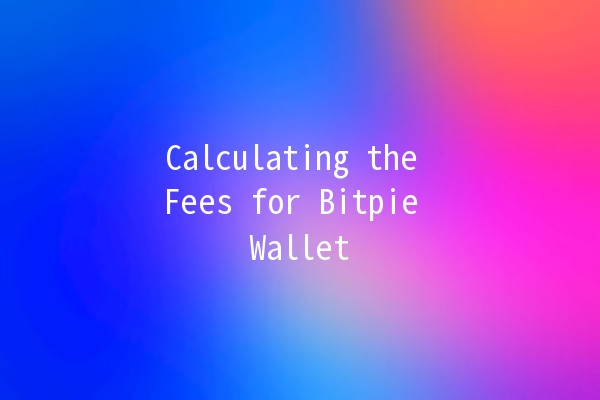
In the crypto world, understanding transaction fees is essential for effective management of digital assets. Bitpie Wallet, a popular multicurrency wallet, provides a secure platform for both holding and transacting cryptocurrencies. However, users often find themselves confused by the varying transaction fees. In this article, we will delve deep into how to calculate and manage fees when using Bitpie Wallet.
Understanding Bitpie Wallet Fees
Before we dive into fee calculations, let’s understand the two primary types of fees associated with Bitpie Wallet:
Knowing these fees is crucial to maximizing your crypto transactions and ensuring you're not paying more than necessary.

How are Transaction Fees Calculated?
Transaction fees in cryptocurrency transactions can be a bit complex, as they are influenced by multiple factors. Below are the main elements that affect transaction fees in Bitpie Wallet:
The biggest factor affecting transaction fees is network congestion. When the network is busy with many transactions, fees go up. This is because miners prioritize transactions with higher fees. During low network activity, fees tend to drop.
Example: Suppose you want to send Bitcoin during peak trading hours; you might pay a transaction fee of $5 or more, whereas during quieter times, this fee could drop to just a few cents.
The size of the transaction, measured in bytes, greatly affects the fee. Simple transactions are smaller and cost less, while those involving multiple inputs and outputs are larger and more expensive.
Example: If you're sending a simple transaction of one output, your transaction size may be around 250 bytes, whereas a transaction with multiple inputs may exceed 1,000 bytes. Fees will be higher for the latter.
Bitpie Wallet often allows users to select a custom fee rate based on the transaction urgency. A higher fee rate will ensure faster processing, while a lower fee rate might result in slower transaction times.
Application Tip: Always check the recommended fee rates on Bitpie and compare them with other wallets to make an informed choice.
Different cryptocurrencies have different average transaction fees.
Example: The fee for Bitcoin might differ significantly from that of Ethereum, due to the differences in their blockchain technology and demand.
Fees can also vary based on the time of day when you're making the transaction. During peak times (such as market launches or after significant news), fees may spike.
Practical Tips for Reducing Fees
Calculation of Service Fees
Service fees are another key element to understand when using Bitpie Wallet. These may include fees for:
Currency Exchanges: Converting one cryptocurrency type to another on the platform.
Withdrawal Fees: Sending cryptocurrency from your Bitpie wallet to an external account/another wallet.
To calculate service fees, users must refer to the current fee policy from Bitpie, as it varies from one currency to another and may change over time.
Example Calculation
For instance, if Bitpie charges a 0.5% fee for every transaction involving currency exchanges:
If you are exchanging $1,000 worth of Bitcoin to Ethereum, you will pay $5 (0.5% of $1,000).
Tips for Managing Service Fees:
Frequently Asked Questions
Answer: Transaction fees can increase due to network congestion, the size of the transaction, the fee rate you select, the particular cryptocurrency used, and the time of day you transact. Monitoring these elements can help you plan your transactions more effectively.
Answer: To save on fees, you can time your transactions for offpeak periods, minimize transaction sizes, and select cryptocurrencies with generally lower fees. Additionally, optimizing the number of transactions you make can also help.
Answer: While Bitpie Wallet is transparent about its fees, users should always read the updated terms of service as fees can vary for different services like currency exchange and withdrawals. It's good practice to doublecheck any fees before executing transactions.
Answer: Various online platforms provide insights into current network conditions and fee trends. Monitoring these insights can help determine the most costeffective times to perform transactions.
Answer: Yes, Bitpie Wallet typically allows users to set a custom fee rate. This is useful for urgent transactions where you want to ensure quicker processing by opting for a higher fee.
Answer: Bitpie charges a specified service fee when converting between currencies. This percentage fee varies based on the transaction size and the types of currencies being converted. It is always advisable to check their fee schedule before making conversions.
Calculating and understanding the fees related to the Bitpie Wallet is vital for minimizing costs associated with cryptocurrency transactions. By considering factors such as network congestion and transaction size, users can manage their fees effectively. Implementing best practices, such as timing transactions properly and consolidating activity, will further enhance your crypto experience.
By being proactive and informed, you can make better decisions with your digital assets. Happy transacting!

